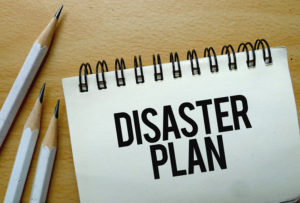Be Prepared for Power Outages at Your Business
December 29, 2022

Tornadoes, floods, fires, and other circumstances beyond your control are all possible threats to your place of business and its profits. In an effort to keep your employees calm and safe, there are a few things you can do to be prepared for the inevitable power outage at work.
1. Know Your Exit Routes
Make sure all employees know how to find the stairs in the event of an emergency exit. Even if your building’s elevators run on backup generators, it’s good for your employees to know where the stairs are. For the rare instance, someone gets stuck, be sure there is a protocol posted inside the elevator. Keep disabled employees’ transportation needs in mind as part of your emergency plans as well.
2. Fire and Security Alarms
Most fire alarms and business security systems will continue to function during a power outage, and also alert you in the event of a power outage. Verify that your fire alarm systems meet the NFPA requirements for battery backup:
“This standard covers performance requirements for emergency and standby power systems providing an alternate source of electrical power in buildings and facilities in the event that the normal electrical power source fails. Systems include power sources, transfer equipment, controls, supervisory equipment, and accessory equipment needed to supply electrical power to the selected circuits.”
The battery backups in both the fire alarm and security systems from Per Mar are supervised, which means you will be notified when they need to be replaced. Batteries generally last three to five years based on how often they are used (e.g. frequency of power outages). If you subscribe to inspections, we will test your batteries each time we inspect your system to ensure you get the most out of them. Contact us for more information about inspections.
3. HVAC & Plumbing
Heating, ventilating, and air conditioning will power down during a power outage. This is can be a huge concern in extreme temperatures. Environmental monitoring can help protect your property against temperature changes and excess water levels. Our sensors measure and record environmental data and alert at the first sign of danger. Employees may want to have coats or jackets available for lengthier periods of time during winter. For the warmer months, keep an eye out for heat stroke.
Buildings with multiple floors may lose water pressure on upper floors during a power outage. In these cases, employees and other building occupants should limit the use of the restrooms.
4. Access Control
If you use our access control system as a level of security in your building, know it also has a battery backup allowing it to continue to function as normal for a period of time during a power outage. If the power outage lasts for an extended period of time, you will still have egress from the building even if the batteries are depleted. At this point, depending on the locking hardware, a key might be required to gain access back into the building.
5. Use Flashlights
When the emergency lighting system comes on and everything else goes dark, don’t opt for candles which are a fire hazard! Instead, use battery-powered flashlights when needed. Employees should have flashlights in their workspace and company vehicles.
Items to keep on hand:
- Batteries and extra flashlights
- A portable, battery-powered radio and/or television
- Nonperishable food and water
6. Electronics & Phones
If you know a power outage is coming, power your electronics down before it hits. Having a UPS (uninterruptible power supply) allows for temporary access to power so you can shut your systems down properly, avoiding data loss. They also provide surge protection to “help prevent the damage that occurs from both power loss and common electrical fluctuations.”1
Verify with your provider ahead of time whether your phone system will work during a power outage, especially when they are key to your business’ livelihood.
7. Invest in a Generator
A generator allows you to maintain customer contact throughout a power outage, keeping revenue losses to a minimum. If you determine that a generator is a sound investment, be certain that you size it properly for your power requirements. Use a wattage generator chart if needed to help determine the size that is right for your business.
8. Powering Everything Back Up
Once the power outage is over, bring your electronics back online in stages to help eliminate potential issues that could occur if there’s a surge in demand before the electric system stabilizes.
Keeping your employees calm, safe, and prepared during a power outage at work is manageable! Preparing before it happens – and when you are thinking clearly – is key. For help in setting up your company’s emergency plans, visit the Occupational Safety and Health Administration’s (OSHA) website for detailed guidelines.
 Careers
Careers Customer Support
Customer Support (800) 473-7627
(800) 473-7627 Contact Us
Contact Us Locations
Locations